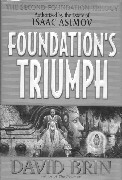 Foundation's
triumph
Foundation's
triumph
by David Brin
A book review by Mark L. Olson
Harper Prism, 1999, 328 pp., $25.00
I've read all of the extended Foundation books. First Asimov Himself welded the Robot books onto the Foundation universe, revealing R. Daneel Olivaw as the secret Master of the Galaxy, an immortal robot who has spent the last twenty thousand years trying to carry out the Three Laws on a galactic scale.
In the original Foundation books, Asimov wrote himself into a corner with the Second Foundation, finding no better solution for Humanity than a secret benevolent dictatorship of the mental elite -- Plato's philosopher-kings. In the later books, he recognized the evil in that and invented Gaia - a mass-mind of enlightened Humanity -- as superior to the Second Foundation.
Gregory Benford, Greg Bear, and David Brin were commissioned to write a trilogy of Foundation novels to extend Asimov's work. Foundation's Triumph is the final book of the the final book of this new trilogy and manages -- just barely -- to pull off a consistent and satisfying ending out of an incredibly convoluted mess. Brin's book manages to satisfactorily tie up the loose ends not just in these last three but in Asimov's late Foundation work, also. It's easily the best of the three and, frankly, better than Asimov's later Foundation books.
The main character in Foundation's Triumph is again Hari Seldon, and the entire book takes place after Seldon finishes recording his Time Vault messages. Old and sick, he can't resist one last attempt to discover what's really going on in the Galaxy. And find out, he does. By the time the book is done he's gotten a good look at just about every secret conspiracy of men and of robots the Galaxy can offer.
Probably the weakest link in the book -- in this whole trilogy -- is the labored explanation of why there has been no Vingean Singularity. Naively, one would have expected a singularity not long after the positronic robot was put into large-scale use, especially combined with the near-simultaneous discovery of interstellar travel. But nothing happened and, in fact, the Galactic Empire seems almost backward compared with the Spacers' Aurora or Susan Calvin's Earth. Why?
Unfortunately, Benford, Bear, and Brin tried to answer that by postulating one or more diseases which -- somehow, I couldn't quite make out how -- have the effect of making high technology societies unstable. I think it would have been considerably wiser to have just ignored the whole issue.
On the other hand, the details of the many and varied schisms amongst the robots is brilliant. It would have happened just like that. Besides the Zeroth Law robots led by Daneel there are Calvinian robots who reject the Zeroth. And both groups are themselves splintered many ways with R. Daneel's group being the largest and best-organized.
Brin mentions in passing secret robot wars where one group of robots fought another group -- robots have absolutely no compulsions about destroying other robots -- though these wars were necessarily secret since all the robots agreed that it would be harmful to people if they became aware of the robots in their midst!
Brin does a fine job of pulling together an over-complicated situation and resolving it satisfactorily. He even manages to deftly hint at a way out of Asimov's basic dilemma of which Master must Humanity accept for its own good -- at the end, Hari Seldon, the real hero of all the Foundation novels, has the last word.
You do need to read the first two books of this latest Foundation trilogy to appreciate Brin's book.
See also my other Brin reviews: Kiln People, Contacting Aliens, Foundation's Triumph
NESFA homepage | Review Index | More Reviews by Mark L. Olson
